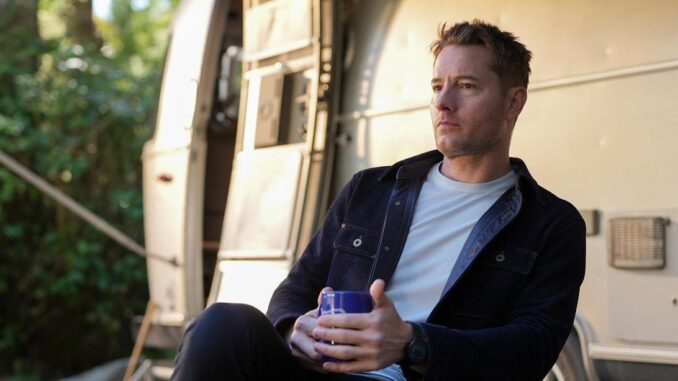
Part of the appeal of a show like Tracker is that Colter Shaw travels the country, inserting himself in different cultures, locations, and spaces that open new doors that he may not have walked through otherwise. In many ways, one could compare Colter to a modern-day gunslinger, a modern drifter who travels between locations to meet needs before riding (or, driving) off into the sunset. The Western influence on a character like this is clear, and with that in mind, I think a Western-themed Tracker episode is long overdue.
Make no mistake. I’m not saying that Colter Shaw needs to travel back in time to the Old West and crossover with Hugh O’Brian’s Wyatt Earp (as cool as that could be), but considering that our hero has often visited states like Wyoming, Montana, Idaho, Colorado, Nevada, and California over the past two seasons (some of them more than once), it’s a crying shame that he hasn’t engaged more with the distinct Western culture found in some of these grand, mountainous regions. There’s just so much to digest.
The potential is certainly there, and it’s easy to see how the dots between Tracker and the Western genre could connect. Just about anything could happen. After all, we’ve already seen Colter take on secret agents, mafia bosses, serial killers, and cults, so why not dive into the more Western-themed elements of American culture? Colter could easily find his way onto the rodeo scene, stop a group of cattle rustlers, search an abandoned gold mine, or even lend a helping hand on a Native American reservation. Given the popularity of shows like Yellowstone, Longmire, Gunsmoke, and so many others (both old and new) that are set in this part of the country, Tracker ought to at least attempt to engage with the cultural identity of the modern West.
A Cowboy Without a Hat
Let’s get one thing straight—Tracker walks like a Western, talks like a Western, but just won’t pull the trigger. Fans and critics alike have noticed how close the hit CBS series dances around the genre, yet it always stops short of embracing the dusty boots and showdown vibe. Why is that? What’s holding Tracker back from going full Western? This article dives deep into the clues, themes, and near-miss moments where Tracker could’ve ridden off into the Western sunset—but didn’t. And if you’re one of those people yelling at the screen, “Just make it a Western already!”—you’re not alone.
Understanding the DNA of ‘Tracker’
What Is ‘Tracker’ All About?
At its core, Tracker follows Colter Shaw (played by Justin Hartley), a lone-wolf survivalist who travels across the U.S. solving mysteries, finding missing people, and righting wrongs. Sound familiar? That’s because it echoes the classic lone ranger motif—just with smartphones and GPS instead of horses and saddle bags.
The Classic Western Blueprint
Cowboys. Open landscapes. Outlaws. Justice served at high noon. Westerns are a genre baked in American mythology. They’re gritty, morally clear, and filled with standoffs that test a man’s soul. While Tracker borrows these tropes, it mixes them with procedural drama and modern settings—watering down the Western flavor just enough to not fully commit.
The Western Elements ‘Tracker’ Nails
The Lone Hero Archetype
Let’s start with the obvious. Colter Shaw is the quintessential Western hero. He’s a drifter. He’s got a rugged moral code. He doesn’t stay in one place too long. And he always shows up when there’s trouble. Sound like a cowboy to you? Exactly.
Wide-Open Americana Landscapes
Whether he’s tracking someone in the dusty plains of Texas or hiking through rocky trails in Arizona, Tracker doesn’t shy away from showcasing sweeping vistas. The cinematography alone screams Western, even if the soundtrack doesn’t.
Justice Outside the Law
Another staple of Westerns is vigilante justice. Colter often bypasses red tape and bureaucratic nonsense. He listens to his gut. If something feels wrong, he acts. He’s not exactly wearing a badge—but he enforces justice all the same.
The Moments That Almost Made It a Western
That Episode in the Desert
Remember the episode where Colter’s stuck in a small town run by a shady sheriff? That was this close to being a Western. The only thing missing was a saloon brawl and a duel in the middle of the street.
Moral Showdowns With a Twist
Time and again, Tracker sets up tense confrontations—sometimes with corrupt officials, sometimes with desperate criminals. These scenes build up just like Western standoffs. But instead of reaching for a revolver, Colter pulls out wisdom or evidence. That’s not a bad thing, just not what Western lovers expect.
Townspeople Crying for a Hero
In several episodes, Colter steps into a community that’s been let down by the system. The townspeople look to him for hope. He brings order, makes things right, then vanishes like a ghost. Classic drifter energy—but still, not fully Western.
What’s Holding ‘Tracker’ Back From Going Full Western?
Modern-Day Setting Dilemma
It’s hard to do a true Western in the age of smartphones, drones, and electric cars. Tracker operates in the now, which naturally limits its cowboy credentials. No one’s herding cattle—they’re tracking signals.
Network TV Constraints
CBS has a broad audience. Going all-in on a niche genre like Western could alienate some viewers. So the writers sprinkle in just enough Western flavor to keep fans intrigued, but not so much that it boxes the show in.
Genre Blending for Mass Appeal
Let’s be honest—procedural dramas sell. By mixing a touch of Western with mystery-of-the-week storytelling, Tracker stays fresh and accessible. It’s strategic, not sloppy.
What Fans Really Want
A Full-On Western-Themed Episode
Imagine this: Colter stumbles upon a ghost town in New Mexico. There’s a land dispute, corrupt officials, maybe even a long-lost gold mine. No cell service. No tech. Just survival, intuition, and a showdown at sunset. Tell me that wouldn’t be the best episode of the season.
A Flashback Episode with Western Roots
Colter’s background is a mystery. What if we got a flashback to his father’s days, dealing with off-grid justice in the remote West? It would make for a gritty, retro-Western experience—without changing the show’s core identity.
Lean Into the Frontier Spirit
Tracker already leans into the concept of freedom, isolation, and moral clarity—why not turn that up to eleven? Give fans a taste of frontier storytelling, even in modern clothes.
Could Season 2 Be the Turning Point?
Hints From Cast and Creators
Justin Hartley and the show’s producers have teased deeper stories and riskier episodes. That could mean a Western-inspired arc is on the horizon. Fingers crossed.
Ratings and Fan Feedback Matter
Fan forums, Reddit threads, and even casual tweets are full of requests for more Western vibes. If the buzz is loud enough, CBS might just give the people what they want.
What a Western Arc Could Look Like
Think “limited arc within the season.” A few connected episodes in a Western-style setting with period themes. Give Colter a moral dilemma that feels ripped from High Noon, and let the audience ride with him through it.

Final Thoughts
So Close, Yet So Far
Tracker doesn’t need a six-shooter to be compelling. But there’s no denying that its Western undertones make the show feel special. And while it hasn’t gone full cowboy yet, the potential is sitting there—like a saddle waiting on a fencepost.
Will the show ever commit to a Western episode? Only time (and maybe ratings) will tell. But one thing’s for sure: Tracker fans are ready to ride.
Conclusion: The Western Just Beneath the Surface
Tracker is like that friend who owns a cowboy hat but never wears it out. You know they want to, but something holds them back. The show teases Western vibes episode after episode—offering moral grit, wide-open spaces, and justice on the move. Yet it keeps a foot firmly planted in procedural drama. And maybe that’s okay. Maybe the best stories are the ones that keep us hoping, guessing, waiting for that perfect Western moment to finally arrive.